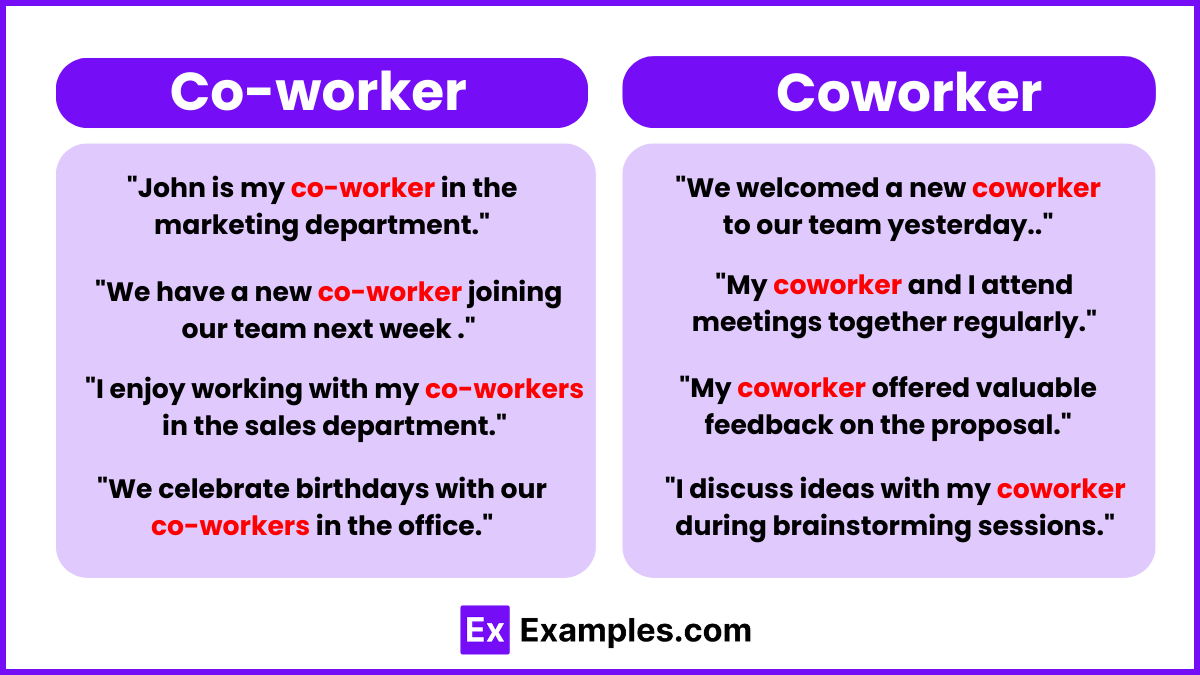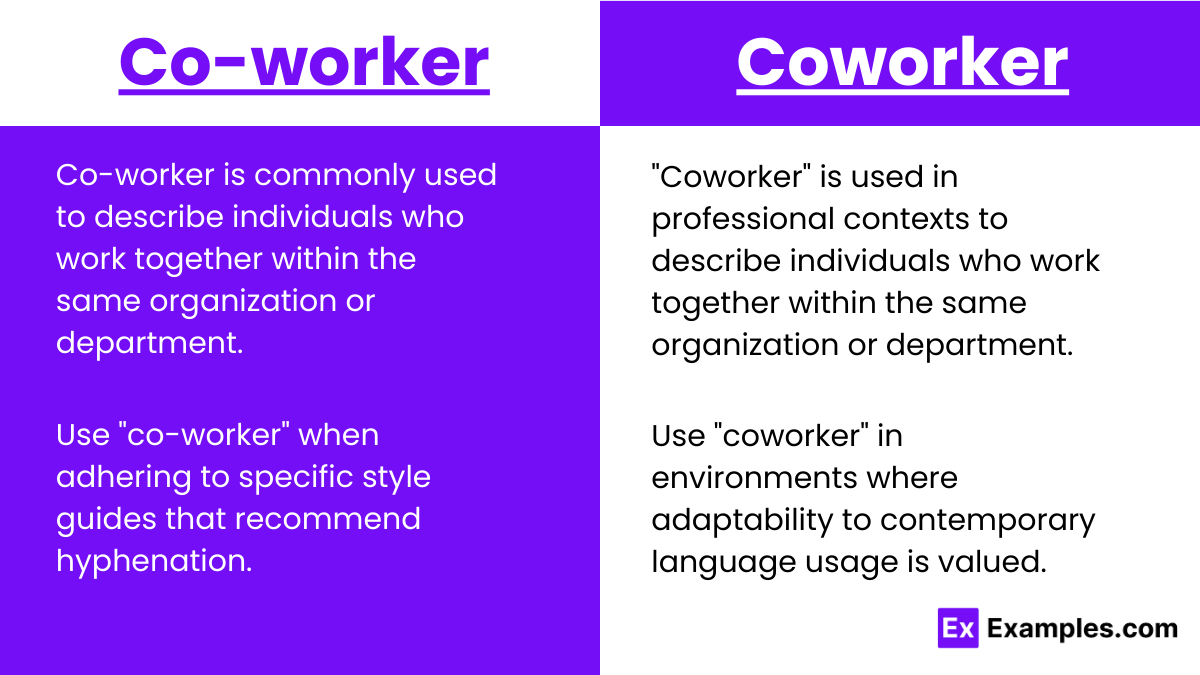Co-worker vs Coworker – Examples, Differences, Usage, Tips
In the intricate landscape of the English language, subtle nuances often lurk beneath seemingly straightforward words, presenting students with perplexing dilemmas. Amidst the myriad of linguistic quandaries, the dispute between “co-worker” and “coworker” stands as a testament to the complexity of spelling conventions. While the essence of the term remains unchanged, the question of whether to hyphenate this compound word or leave it unhyphenated evokes differing opinions, challenging conventional notions of correctness.
At the heart of this linguistic conundrum lies the elusive quest for a definitive answer amidst conflicting preferences. While some adhere steadfastly to the conventions of specific style manuals, others navigate the terrain with a more flexible approach, embracing the inherent ambiguity of language. The dichotomy between “co-worker” and “coworker” mirrors the broader debate surrounding language evolution, where tradition intersects with modern usage, leaving students to ponder which spelling pathway to traverse in their linguistic journey.
Co-worker and Coworker – Meanings
Co-worker: A co-worker refers to an individual with whom one shares a workplace or employment setting. These colleagues collaborate on tasks, projects, or duties within the same organization, contributing to the overall productivity and functionality of the work environment. Co-workers often interact professionally, exchanging ideas, support, and resources to achieve common goals and objectives. The term encompasses individuals across various departments, levels of hierarchy, or job roles within a company or institution.
Coworker: A coworker, similar to a co-worker, denotes a person who shares a workplace or employment context with others. The term is often used interchangeably with “co-worker” and carries the same meaning. It refers to individuals who work alongside one another within the same organization, engaging in collaborative efforts, teamwork, and professional interactions to accomplish mutual tasks and objectives. Whether spelled with a hyphen or as a single word, “coworker” signifies the collective camaraderie and cooperation within a work environment.
Summary
In the realm of workplace dynamics, the distinction between “co-worker” and “coworker” may seem subtle, but it reflects the collective essence of collaboration within organizational settings. Both terms encapsulate the concept of individuals sharing a common workspace or employment context, where they collaborate, exchange ideas, and contribute to the overall productivity and functionality of the environment. These colleagues, regardless of departmental affiliations or hierarchical positions, engage in professional interactions, teamwork, and mutual support to achieve common goals and objectives.
Difference Between Co-worker and Coworker
Navigating the subtle nuances between “co-worker” and “coworker” can be puzzling. Despite their seemingly interchangeable usage, slight distinctions exist. Let’s unravel these differences through a concise comparison.
| Aspect | Co-worker | Coworker |
|---|---|---|
| Spelling Preference | More traditional; often hyphenated. | Increasingly accepted as a single word. |
| Formality | Conveys a slightly more formal tone. | Generally used in informal contexts. |
| Usage | Common in formal writing and documentation. | Frequently used in casual conversations. |
| Style Guides | Follows traditional spelling conventions. | Adapts to modern language trends. |
| Industry Standards | Reflects established spelling norms. | Adapts to evolving linguistic preferences. |
| Perceived Correctness | Often considered the standard form. | Gains acceptance as language evolves. |
| Hyphenation | Typically includes a hyphen (-). | Increasingly omitted in modern usage. |
| Regional Variations | Consistent across regions. | Reflects language shifts in global usage. |
| Formal Documentation | Preferred in official documents. | May be seen as outdated in some contexts. |
| Linguistic Evolution | Resists changes in spelling norms. | Reflects adaptability to modern language. |
Examples of Co-worker and Coworker
In the realm of professional relationships, “co-worker” and “coworker” denote individuals sharing a common work environment. Despite subtle differences, both terms signify collaborative dynamics within organizational settings.
Examples of Co-worker:
- John’s co-worker, Sarah, assists him with project management tasks.
- The team celebrated their co-worker‘s promotion to a managerial position.
- Every co-worker in the department contributes to the weekly team meetings.
- Mike’s co-worker offered valuable feedback on the client presentation.
- The co-worker camaraderie fosters a positive work culture within the company.
Examples of Coworker:
- Jane’s coworker recommended a new approach to streamline the workflow process.
- At the company picnic, employees enjoyed mingling with their coworkers from different departments.
- The coworker collaboration resulted in a successful product launch.
- Tom’s coworker provided support during a challenging project deadline.
- Engaging with coworkers in team-building activities strengthens workplace bonds and morale.
When to Use Co-worker and Coworker
Determining when to use “co-worker” or “coworker” can be perplexing amidst their interchangeable usage. Let’s clarify their distinctions to ensure accurate and contextually appropriate language application.
Usage of “Co-worker”:
- Prefer “co-worker” in formal or traditional writing styles.
- Use “co-worker” when adhering to specific style guides that recommend hyphenation.
- Opt for “co-worker” in environments where traditional spelling conventions are upheld.
- Employ “co-worker” in documents requiring adherence to established spelling norms.
- Choose “co-worker” when aiming for a slightly more formal tone in communication.
Usage of “Coworker”:
- Utilize “coworker” in informal or casual contexts.
- Prefer “coworker” in modern or evolving language trends that favor omitting hyphens.
- Opt for “coworker” in everyday conversations or informal written communication.
- Use “coworker” in environments where adaptability to contemporary language usage is valued.
- Choose “coworker” to reflect a more relaxed or approachable tone in communication.
Tips for Co-worker and Coworker
Here are insightful tips for Co-worker and Coworker to navigate their usage effectively, ensuring clarity and consistency in professional and casual contexts.
- Consider Formality: Choose “co-worker” for formal writing and “coworker” for informal or casual communication.
- Follow Style Guides: Refer to style manuals for specific spelling preferences in professional documents.
- Understand Context: Determine the appropriate spelling based on the formality and tone of the communication.
- Stay Consistent: Use one spelling consistently throughout a document or conversation to avoid confusion.
- Consider Audience: Adapt the spelling to match the expectations and preferences of your audience.
- Be Flexible: Recognize that both spellings are acceptable and adapt based on evolving language trends.
- Proofread Carefully: Double-check for spelling consistency and correctness to maintain professionalism.
- Seek Clarification: When in doubt, consult reputable sources or ask for clarification to ensure accuracy.
FAQs
Are co workers and colleagues the same?
Co-workers and colleagues often refer to individuals in a professional setting, but there’s a subtle distinction. “Co-workers” specifically denote people you share a workplace with, while “colleagues” encompass a broader range, including those in the same field or industry, regardless of workplace proximity.
Is it coworker or co-worker?
Both “coworker” and “co-worker” are correct spellings, but usage varies. “Coworker” is increasingly preferred, reflecting modern language trends, while “co-worker” adheres to traditional spelling conventions.
Can you call a boss a coworker?
Referring to a boss as a coworker depends on context and workplace dynamics. While they share the same workplace, the term “coworker” may not accurately convey the hierarchical relationship. It’s advisable to use terms like “supervisor” or “manager” to maintain professionalism.
Is it different with co-working?
“Co-working” refers to shared workspaces where individuals from different organizations or professions work independently. It differs from “co-worker” or “coworker,” which denote individuals sharing a specific workplace, while “co-working” describes the concept of shared workspace environments.





